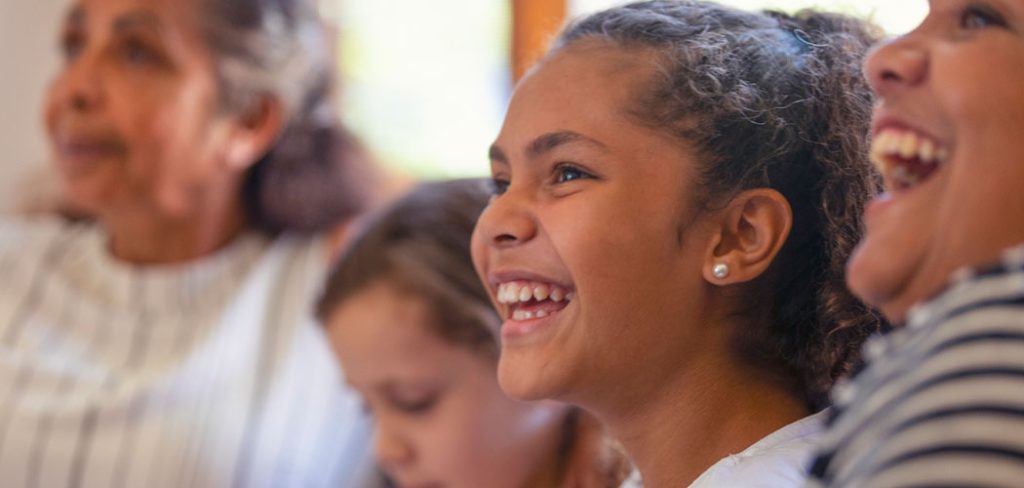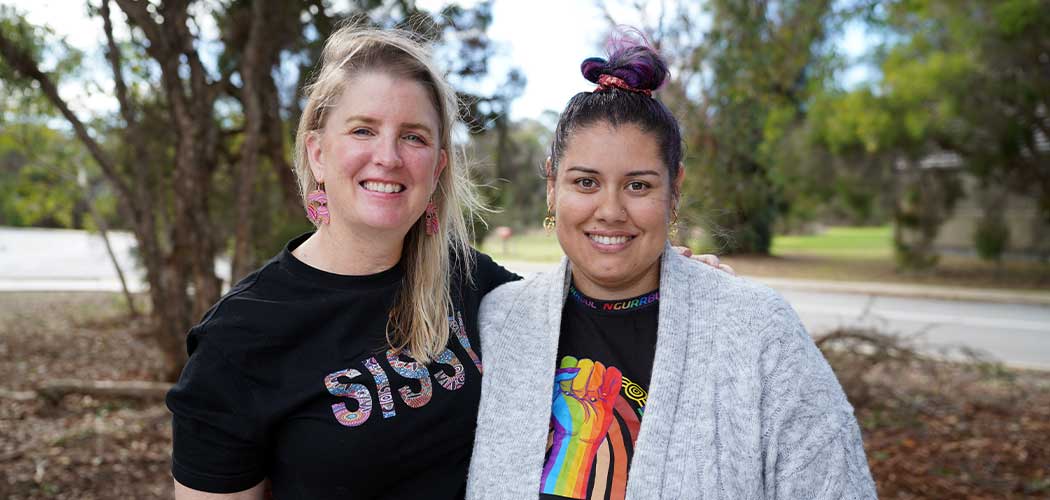Aboriginal women have been mothering for more than 65,000 years, yet there is still a vast underrepresentation of Aboriginal health clinicians in the perinatal sector.
This has run-on effects, with Aboriginal mothers struggling to find culturally safe healthcare during the most crucial years of their babies’ lives.
Bridgette Kelly and Trish Ratajczak from Murdoch University’s Ngangk Yira Institute for Change are passionate about changing this, with both addressing these gaps in their Accelerated Master’s by Research theses.
Bridgette, a proud Kamilaroi woman, and Trish, a proud Palawa Trawlwoolway woman, have years of experience in the perinatal health space, and hope their research inspires other Aboriginal people to enter university and reclaim their rights to culturally safe healthcare.
In Trish’s thesis the Baby Coming You Ready (BCYR) program, a model of care designed to overcome communication barriers between Aboriginal women and their healthcare providers, is shown to empower women’s decisions and voices in driving strong perinatal care.
“It is not acknowledged enough, the resilience and self-efficacy of Aboriginal women,” Trish said.
Her findings demonstrated that BCYR both recognised and supported the resilience and self-efficacy of Aboriginal mothers and supported strengthening women’s perinatal mental health journeys.

This strength-based cultural care, if implemented in the wider healthcare sector, would help to improve maternal and infant outcomes, while also building trust and continuity of care.
Lack of cultural understanding is something Trish witnessed regularly working in midwifery.
“A mother shared with me during my research that she wanted to take her baby on Country, to strengthen her baby’s identity and connection to Country, but was worried that if she told her midwife her baby would be taken away, because bubba was a newborn,” Trish said.
In Bridgette’s thesis, she explored what contributes to strong, trusting relationships between child health nurses, Aboriginal clients and their families.
Her findings identified a critical gap that should be filled by a child health adaptation of BCYR, which would better support the needs of mothers with infants, child health nurses and community health services across WA.
Further recommendations included an extended co-design of BCYR capturing child health milestones, image and language adaptations.
“During my research there were so many yarns about women not feeling safe to talk to their child health nurse,” Bridgette said.
She found that strong relationships led to culturally safe care and added that it was important to implement support and care for mothers that continued after their babies were born and throughout their early years.
Not only are Bridgette and Trish passionate about increasing the number of Aboriginal healthcare workers, but they also want to show other Aboriginal people that their lived experience matters and is enough to start studying.
“What people refer to as research, Aboriginal mob have been doing for years,” Trish said. “Truth-telling, storytelling and yarning are such big parts of our culture.”
“It just goes by a different word – if you talk about it with other Aboriginal mob you’ll hear ‘oh, I already do that’,” Bridgette said.
As well as truth-telling being second nature, Trish and Bridgette said family and community are everything, and the main inspiration for their Master’s’.
Both women have families, work fulltime and say they leaned on each other for support throughout their studies.
“We never even read one part of each other’s thesis until they were published, but we would sit in the same room and encourage each other to keep going,” Trish said.
“That’s just us, that’s our culture, the way we work and the way we are.”
Bridgette said she and Trish would often push each other to study, even when it got hard.
“We would both just be like, okay – Masters time – let’s go. And we’d both go sit in the office together and work, just knowing we were both there for each other.”
Just before submission, Trish was faced with another enormous test of resilience when her husband was diagnosed with a serious illness.
“I can’t tell you how much I wanted to throw it all in and give up – but my husband, my supervisors and Bridgette motivated me to just keep going,” she said.
Once their papers were published, Trish and Bridgette said the feedback from community reinforced the importance of their hard work.
“People working in the healthcare sector have acknowledged the importance of my thesis. And women have thanked me for amplifying our voices in the research world,” Trish said.
Bridgette said she hoped their stories could inspire even one Aboriginal person to pursue their career and study dreams.
“If someone looks at us and says, ‘if they can do it, I can do it too’. That’s amazing.”
Both women said the support of the staff at Ngangk Yira Institute for Change was paramount, and their work continued to inspire change in the healthcare space.
Find out how Baby Coming You Ready prioritises the perinatal and postnatal mental health of Aboriginal mothers.








